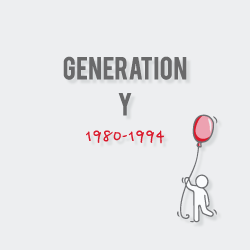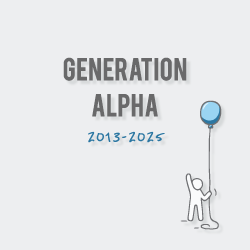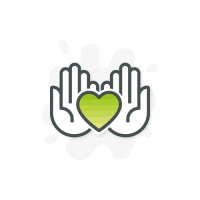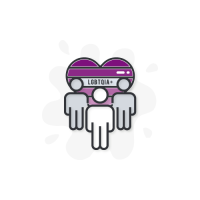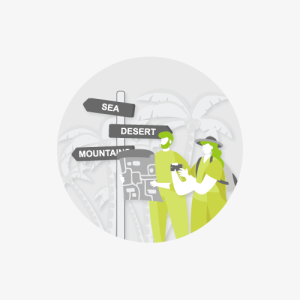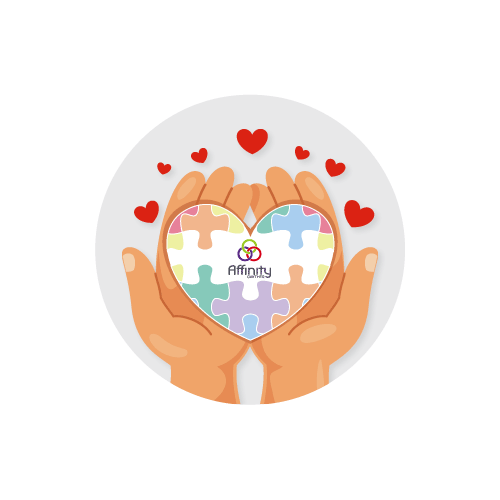
Generations

Medical advancements that increase how long a person lives to the implementation of technology that aids and makes our lives easier define and shape our quality of life. Though people are unique, these shared events and experiences help to mould and shape who we will become, and the generation we belong to can be used as one of many indicators to understand a person better
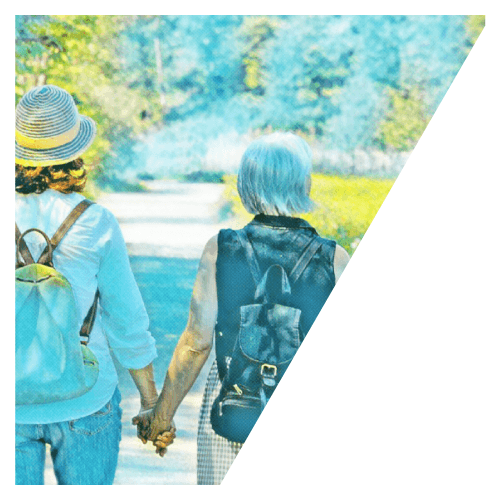
Generations are used from a sociological science and analysis perspective to understand behaviours, environments and attitudes generally held by people from a specific era. Though individuals from a particular generation may share similarities, other factors will also come into play. Factors such as the country, region, or continent they are born within and other influences such as education, religion, and social-economic status.
Knowing which generation an individual is born within helps us understand a broad aspect of their background. However, much of the analysis will be general and may include stereotypical behaviours and attitudes. The reality is that we are all unique and respond differently to the situations we face. Generations are a reasonable indicator but are not to be used as a strict definition of what makes a person who they are.

Pronounciation: (thuh in-tur-bel-um jen-uh-rey-shuhn | ðə ɪn.tərˈbɛ.lʏm ˈdʒɛn əˈreɪ ʃən)
Year of Birth (ages in 2023): 1901 – 1913 (ages 110 to 122)
Other Nicknames: G.I. Generation- The term interbellum, which means between wars, refers to the fact that people from this generation who were too young to join the fight in World War I and too old to participate in World War II
- Anyone visiting a country with a hot climate will be thankful for air conditioning; did you know it was invented in July 1902? Willis Haviland Carrier, a graduate of the ivy league university, Cornell in the USA, invented the mechanism and components that are still used in the design of modern-day air conditioning units
- Even though plastic was invented in the mid-to-late 1800s, it was not until 1905 that Leo Baekeland created the first fully synthetic thermoset. The first time the material could be used on a large scale. The new material was adapted over the years and was the basis of the many new types of modern-day plastics
- Sigmund Lindauer from Germany developed the first mass-produced women’s bra in 1912 and later created the patent in 1913. The bra was a revolutionary invention for women as it freed them from the corset, which was constricting and uncomfortable. Just one year later, in 1914, saw the creation of the zip, which is used in most modern-day clothing
World Population: 0 people
- Africa (0%)
- Asia (0%)
- The Americas (0%)
- Europe (0%)
- Oceania (0%)
LGBTQIA+ Population: c.0 people

SAFETY
The average number of countries that had not decriminalised same-sex relationships

ACCEPTANCE

VISIBILITY

COMMUNITY
Timeline
- The late 1800s saw attitudes changing towards sexuality and gender identities. Even though just 71 or 30.5% of countries worldwide had decriminalised same-sex activities, laws still existed, whether sodomy or indecency. If caught engaging in same-sex relations in public, a person could be arrested and imprisoned for long periods. Many gay, lesbian and transgender people would keep their identities hidden, only expressing themselves amongst like-minded people. Visibility or the ability for a person to accept who they were was improving; however, non-traditional sexual and gender identities were still seen as a medical illness, one that could get a person committed
- Religion and traditional values dominated society, so more progressive-thinking individuals accepted the gay community. Generally speaking, most would see those that identify as gay or transgender as deviant and having a mental illness. With the telegram and letters being the primary means of communication, connecting with other like-minded people was challenging, and meeting community members worldwide was difficult. Large cruise liners would take people on transatlantic trips taking weeks, and with wars and pandemics, many gay people lived in isolated environments
Environment
- Towards the end of the 19th century and early 1900s, the gay community began to thrive in western cities worldwide until the 1930s. In cities such as New York, Harlem and Greenwich Village, neighbourhoods were becoming popular and frequented areas for gay men and women to gather and socialise. Though being gay was still defined as a mental illness within most countries, in many cities and built-up areas, attitudes were slowly changing toward members of the community
- Sexual freedom was very different amongst the various classes and societies; those in privileged positions would attend private parties in which they could express their gender or sexuality freely; however, those from more working-class backgrounds would take considerable risks in meeting other gay people at bathhouses and public toilets
TAKING PRIDE IN YOU

Pronounciation: (thuh greit-uhst jen-uh-rey-shuhn | ðə ˈɡreɪtɪst ˈdʒɛn əˈreɪ ʃən)
Year of Birth (ages in 2023): 1910 – 1924 (ages 99 to 113)
Other Nicknames: G.I. Generation, Lost Generation
- Referred to as the Greatest Generation, those from this generation grew up during the Great Depression in the 1930s. With many coming of age and participating in World War II. A generation that ultimately survived and overcame significant obstacles
- The first world war started in July 1914 and continued until November 1918. One of the deadliest conflicts during that period, with an estimated 22 million people losing their lives throughout the battle. The war, also known as the Great War, was between what is known as the Central Powers (Germany, Austria-Hungary, Bulgaria and the Ottoman Empire). Countries at war with the Allied Powers (Great Britain, France, Russia, Italy, Romania, Japan and the United States). The war became a turning point in terms of modern-day warfare and directly attributed to the Russian Revolution that took place in 1917
- Sonar, the technique that uses sound to detect objects underwater, was experimented on for centuries, with underwater sound communications recorded by Leonardo da Vinci in 1490; however, it was in 1912 that the Canadian engineer Reginald Fessenden developed depth sounding, underwater communications and echo ranging
- The first-ever passenger airline service took flights in 1914, flying between St Petersburg and Tampa, both in Florida in the USA. The service only lasted four months; however, it paved the way for modern-day airline passenger services
World Population: 1.1 million or 0.01%
- Africa (1.7%)
- Asia (23.6%)
- The Americas (46.2%)
- Europe (27.2%)
- Oceania (1.3%)
LGBTQIA+ Population: c.28.5 thousand
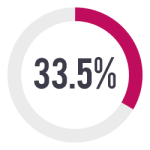
SAFETY
The average number of countries that had not decriminalised same-sex relationships

ACCEPTANCE

VISIBILITY

COMMUNITY
Timeline
- The 1920s, also known as the roaring 20s, saw the community gaining more confidence. The number of countries decriminalising same-sex laws increased to 78 or 33.5%, and gay bars and clubs began to appear in more liberal and open-minded cities. Many notable sexologists and scientists began to explore sexuality and gender identities in more detail, and many gay men and women would freely and publicly display more flamboyant behaviour
- The term flamboyant would often be used to describe someone who works within the theatre or the arts, often describing someone eccentric or engaged in same-sex relationships. Acceptance was slowly beginning to improve; however, many western cultures were still heavily influenced by religion and traditional values. Small groups and even areas within major cities became regular meeting points for many from within the gay community, and this period started to become a turning point for the movement
Environment
- The roaring twenties was a period in which acceptance was beginning to increase. The gay community slowly integrated into urban areas, with a visible LGBTQIA+ nightlife featuring gay bars and clubs. With frequent drag balls and venues where LGBTQIA+ and heterosexual people would all attend, venues and events where individuals, straight and those with different gender and sexual identities, could socialise and be entertained. Gay characters were beginning to be featured in novels, within plays and covered by mainstream media
- At the time when women were still fighting for equal treatment, many gay men and women in western countries were beginning to have a lot more freedom sexually; however, wider society was less accepting, with many, amongst the majority, still holding conservative and traditional values in which LGBTQIA+ was viewed as perverted and as an illness

Pronounciation: (thuh sahy-luhnt jen-uh-rey-shuhn | ðə ˈsaɪ lənt ˈdʒɛn əˈreɪ ʃən)
Year of Birth (ages in 2023): 1925 – 1945 (ages 78 to 98)
Other Nicknames: Traditionalists
- Referred to as the Silent Generation referencing the fact that they were born into the Great Depression and grew up during the Second World War, many had challenging childhoods; however, after the war, they were faced with the task of rebuilding and repopulating the world
- The second world war started in September 1939 and lasted until September 1945. It was between the Axis Powers and the Allies, with an estimated 75 million people losing their lives throughout the conflict. The Axis Powers included three major countries, Germany, Italy, and Japan, followed by seven supporting countries, including Hungary, Romania, Slovakia, Bulgaria, Croatia, Finland, and Thailand. The Allies were made up of what were known as the big three, which included the United Kingdom, the Soviet Union and the United States of America. Supported by 11 countries in exile and nine combatant states, including China, India, Canada, Australia, New Zealand, South Africa, Brazil, Mongolia, and Mexico
- A significant modern-day medical development occurred in 1928 when Scottish physician Alexander Fleming discovered Penicillium, which was used to kill bacteria and create an antibacterial substance. Penicillium, since its production, has saved hundreds of millions of lives worldwide
- There were many methods invented for freezing and preserving food; however, it was in 1924 that Clarence Birdseye invented the quick-freezing method, which forms the basis and principles for the frozen foods process used even today
World Population: 206.5 million or 3%
- Africa (4.5%)
- Asia (17.2%)
- The Americas (53.9%)
- Europe (23.5%)
- Oceania (0.9%)
LGBTQIA+ Population: c.5.4 million

SAFETY
The average number of countries that had not decriminalised same-sex relationships

ACCEPTANCE

VISIBILITY

COMMUNITY
Timeline
- The Second World War significantly impacted the gay community; those living within the axis power countries (Germany, Italy and Japan) known to have carried out same-sex acts would be rounded up and taken to the Nazi ghettos and camps. The number of countries decriminalising same-sex laws had increased to 98 or 42%. However, even amongst the Allied forces, being a homosexual would often see a person being discharged from service and imprisoned on indecency charges. The war and world attitudes forced the gay community to regress for fear of persecution
- Hostility by the axis powers and being classified as deviant and immoral within the allied forces, many gay men and women were forced to suppress and hide their sexuality. The growing level of acceptance seen during the 1920s began to reduce. Many were forced to keep their identities a secret. The war saw many gay men and women coming in contact with people from all over the world. With neighbouring and even forces from all over the globe mixing and socialising during battles and combats. Though same-sex relationships were considered a serious crime and people committing them would be prosecuted if caught, gay men and women would become adept at hiding and communicating with one another in plain sight, avoiding detection
Environment
- After recessions, wars and pandemics, the gay community began experiencing a backlash during the 1930s, 40s and 50s from many countries and societies worldwide. The impact and toll on world economies and the wider population resulted in gay men and women becoming targets, forcing them to become much more secretive and hide in plain sight
- During the late 1930s, the second world war began. Many LGBTQIA+ men and women in Germany and all countries occupied by the Nazis were rounded up with Jewish citizens and taken to ghettos and camps. People in the encampments were forced to wear badges to identify which group they belonged to and their beliefs, sexual or gender identity. Jewish men and women were forced to wear the yellow star of David on their uniform; gay men were made to wear a pink triangle. Black triangles were a catchall for all perceived deviant behaviours, including Lesbians, transgender people and all other LGBTQIA+ identities. It is estimated that over 100 thousand LGBTQIA+ men and women lost their lives in the Nazi death camps during world war II
DISCOVER HOW WELL THE COMMUNITY ARE TREATED..

Pronounciation: (bey-bee boo-mer | ˈbeɪ bi ˈbu mər)
Year of Birth (ages in 2023): 1946 – 1964 (ages 59 to 77)
Other Nicknames: Boomers
- Baby boomers are the generation born immediately after the end of World War II. The baby boomers were born to parents who were actively encouraged to procreate during a period of great hope, optimism and recovery
- In 1952, Christine Jorgensen became the first to receive international recognition for undergoing sex reassignment surgery. Five years after the surgery, the renowned sexologist Dr Harry Benjamin created the term Transsexual
- The 1950s and 60s were exciting periods for space exploration. In 1957, the Soviet Union, during the space race, launched the first artificial satellite, known as Sputnik 1, into space. It was twelve years later that the United States of America launched the Apollo 11 mission, which resulted in Commander Neil Armstrong being the first man to walk on the moon’s surface
- In 1947, three men, John Bardeen, Walter Brattain and William Shockley, invented the first working transistor. The transistor revolutionised the world and is considered one of the most important inventions. The transistor is a switch that allows electrical currents to flow or stop, which has become an integral part of electronic devices
World Population: 1 billion or 13%
- Africa (7.7%)
- Asia (15.6%)
- The Americas (60.4%)
- Europe (15.7%)
- Oceania (0.7%)
LGBTQIA+ Population: c.26.9 million

SAFETY
The average number of countries that had not decriminalised same-sex relationships

ACCEPTANCE

VISIBILITY

COMMUNITY
Timeline
- The second world war took a toll on the world’s population. Over an estimated, 75 million people lost their lives, many of them from the younger generations during that period. After the war ended, many of the older generations played a big part. They influenced those born on or after the war. Survivors and those growing up after the war were encouraged to help rebuild and repopulate countries. Some countries with severely affected populations began campaigns to encourage people worldwide to relocate. The war and treatment of the LGBTQIA+ community saw more countries decriminalise their same-sex laws. The number increased to 116 or 49.7%, almost half of the nations around the world. The gay community started becoming more visible; however, due to the conservative mindset amongst the majority of society, many would opt to use secretive codes, symbols and signs
- Many people who made connections during the second world war saw pen-pals start. A trend even amongst the gay community, creating international relationships by corresponding with their former colleagues. Bars and clubs also began to pop back up in specific areas. During the second world war, the loss of the younger generations put back the community by at least 20-30 years, as older generations played a significant role in bringing up and influencing the newer generations. Acceptance was increasing amongst more liberal and open-minded people. With scientific and medical research understanding sexuality and gender identities better, people began changing their view of the community. A significant shift was amongst the Jewish community; in solidarity with the gay community’s treatment during the war, many more modern and conventional Jewish denominations began to show their support for the gay community
Environment
- After the war, many countries worldwide saw a devastating loss of life; even with all the devastation, a growing sense of community and camaraderie ensued. During the boom periods after the war, traditional values and religious beliefs were encouraged, forcing many LGBTQIA+ members to hide and keep their sexual or gender identity a secret. The groups that had seen the most significant number of lives lost were amongst younger people (those aged 30 or younger), resulting in older generations remaining the majority and becoming the primary group influencing the generations that were infants or those that were born after the war
- Many LGBTQIA+ individuals learnt to hide their sexuality through secretive languages such as Polari, using the handkerchief code or the blue stars as an indicator or signal to identify one another. The use of these secret signs and codes was to avoid detection and from being arrested while at the same time meeting other like-minded people. Though many countries began to repeal the criminalisation of same-sex relationships, often, the police would use other laws, such as indecency laws, to prosecute members of the community

When we think back to the late 1800s, most homes worldwide did not have electricity. Back a further 100 years, hygiene and sanitation were serious daily issues many faced. Industrial and technological advancements all impact the environment a person grows up within and their behaviours and attitudes. Religion, psychological and scientific understanding also help to mould and structure how people think and feel. The more we learn and understand, the more tolerant and empathetic we are towards others.
EXCEPTIONAL AND DIVERSE LGBTQIA+ COMMUNITY
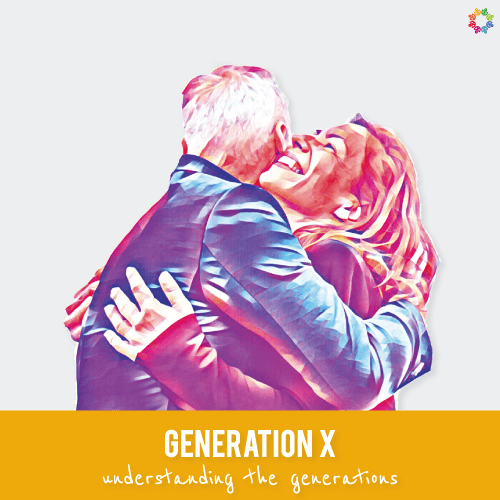
Pronounciation: (jen-uh-rey-shuhn wahy | ˈdʒɛn əˈreɪ ʃən ˈwaɪ)
Year of Birth (ages in 2023): 1965 – 1979 (ages 44 to 58)
Other Nicknames: Baby Bust, Xennials (1975-1985), Thirteeners
- People from Generation X were born into a period of great discovery and innovation. From the moon landing in 1969 to the launch of the first personal computer, many grew up in a period of significant technological advancement. Gen X individuals are also referred to as Baby Bust given that, unlike their parents, many opted to start families later in life, have small families or not to start families at all
- The modern-day internet as we know it started in 1969. It was in 1975 that Vinton Cerf and Robert Kahn developed the TCP/IP protocol, which is still used today, a protocol that breaks down data into smaller packets, making it easier and quicker for data to be transferred
- Medicine and life-supporting technology have seen significant advancement over the past 50 years. As a result, we have seen life expectancies and people’s general health dramatically increase. In 1969, we saw the successful creation and implant of an artificial heart, which is used to replace a person’s heart to keep them alive until a permanent donor can be transplanted
- You will typically come across a cash dispenser whenever you visit a public station, high street, mall or built-up area. Cash dispensers have made it easy to get access to your money any time of day, anywhere around the world; however, it was only in 1969 that they were first developed and implemented
World Population: 1.4 billion or 17%
- Africa (11%)
- Asia (13.6%)
- The Americas (63.7%)
- Europe (11.2%)
- Oceania (0.6%)
LGBTQIA+ Population: c.36.1 million
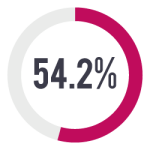
SAFETY
The average number of countries that had not decriminalised same-sex relationships
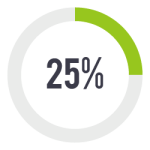
ACCEPTANCE

VISIBILITY
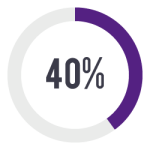
COMMUNITY
Timeline
- Countries and many societies worldwide were put back from a progressive viewpoint. Public opinion suffered a setback given the great generation’s influence on the baby boomer generation. Many baby boomers held much more conservative and traditional values, turning more towards religion and antiquated beliefs typically relating to the community. Some baby boomers who identified as gay would find clever ways to meet other like-minded people, often hidden, secretive and in plain sight. Very few positive role models existed and people being outed were usually a result of a targeted campaign by media outlets. The number of countries that had decriminalised same-sex laws had increased to 126 or 54.2%, and after the Stonewall riots, positive changes started to take place in the community
- The community suffered a significant setback when HIV and AIDS became a pandemic. When little information was known about the disease, it initially was believed to have been a gay disease, given how quickly it spread amongst the gay community. Many straight people, ill-informed about the disease, would often avoid any contact, even touching an infected person, and the media and societies as a whole became much more hostile towards the community
Environment
- By the 1960s and 1970s, many doctors and psychiatrists continued to explore sexual and gender identities, with many research and discoveries relating to gender and sexuality being forced to stop due to the second world war. Many national psychiatric institutes began to accept and change the definitions relating to the community. Moving away from being seen as a psychological illness and a choice that a gay or transgender person consciously or subconsciously makes. Public figures began to speak more publicly about their sexuality, and in the USA and other western countries around the world, members of the community were becoming elected to office
- Like in the 1920s, during the 1960s and 70s, the gay community thrived in major western cities; however, it was commonplace for the police and even the general public to harass openly gay people and establishments. In 1969, the Stonewall Inn in New York City, a well-known gay bar, became the location for a landmark event. Many were saddened by the death of Judy Garland, whose funeral had recently occurred. Coupled with the frustration of the constant harassment from law enforcement officers, the local community began to riot in protest of their treatment after the Stonewall Inn was raided. The riots latest six days and received worldwide media attention, and became a catalyst for the Gay global movement

Pronounciation: (jen-uh-rey-shuhn eks | ˈdʒɛn əˈreɪ ʃən ˈɛks)
Year of Birth (ages in 2023): 1980 – 1994 (ages 29 to 43)
Other Nicknames:: Gen Next
- People from Generation Y were born into a period when media began changing, the internet was invented in 1983, and by the late 1990s, personal computers became more affordable, and dial connections meant more people began connecting to the World Wide Web
- It is common practice for professional photographs to be touched up, removing imperfections, replacing backgrounds, and even superimposing images; however, it was in 1987 that Adobe launched Photoshop, the first photo editing software
- Laptops have made connecting to the internet and working remotely quick and straightforward. Laptops are portable, often lightweight and enable users to work anywhere, at any time; however, it was in 1989 that Apple launched its first battery-powered device known as Macintosh Portable
- The introduction of email helped speed up our communication; however, mobile phones became more affordable and accessible in 1992, and text messaging helped with real-time communications. Mobile phone users were able to text one another instantly, enabling users to message one another using this new communication method
World Population: 1.7 billion or 21%
- Africa (15.5%)
- Asia (13.2%)
- The Americas (61.9%)
- Europe (8.9%)
- Oceania (0.6%)
LGBTQIA+ Population: c.45.5 million
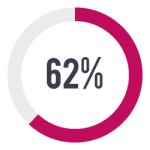
SAFETY
The average number of countries that had not decriminalised same-sex relationships

ACCEPTANCE

VISIBILITY

COMMUNITY
Timeline
- The HIV and AIDS pandemic dominated the early years of Generation Y, with growing hostilities towards the community. The number of verbal and physical attacks on members of the LGBTQIA+ community was on the rise. Many tv shows and films featured narratives reflecting the feeling of society. People growing up during this era were made to feel that identifying as gay, lesbian or transgender was terrible, and many struggled to come to terms with their sexuality or gender identity. The 1990s saw the most significant number of countries decimalising same-sex relationships, taking the total number of countries to 144 or 62%. Public figures were becoming more open about their sexuality, and a trend was starting with more positive gay role models worldwide
- Though there was still some fallout from the HIV and AIDS pandemic, as the virus was understood better, people became more understanding of the LGBTQIA+ community. People started to come out more to friends and family, and even more organisations were mobilising to support and represent the global community. More openly gay and transgender politicians were becoming elected to office, and with the birth of the internet, more gay people were connecting to and with the international LGBTQIA+ community
Environment
- After the Stonewall riots, organisations and activists became much more publicly vocal and received much more media coverage. These groups ramped up their protests for equal treatment and recognition within the law. Attitudes towards the gay community also began changing. In the 1970s, over 37% of countries worldwide never had rules relating to same-sex relationships or had repealed and decriminalised same-sex laws. Though the community became much more vocal, there were still resistance and vocal opposition from older generations citing religious and traditional values for suppressing the rights of many within the community
- Some significant LGBTQIA+ events began to occur; in 1972, Sweden became the first country to legally allow transsexuals to change their gender and provide free hormone therapy. In 1972, Harvey Milk, an openly gay man, was elected as city-county supervisor in San Francisco, California, in the USA. Sadly, in the case of Harvey Milk, eleven months after being elected, Harvey was murdered by the disgruntled former city supervisor, Dan White, who murdered Harvey as well as Mayor Moscone
WHAT LANGUAGES ARE SPOKEN WHERE

Pronounciation: (jen-uh-rey-shuhn zee | ˈdʒɛn əˈreɪ ʃən ˈzi)
Year of Birth (ages in 2023): 1995 – 2012 (ages 11 to 28)
Other Nicknames: iGen, Gen Z, Millennials (born after the 2000s), New Silent Generation
- People from Generation Z were born into the information age and the social media boom, with services such as Wikipedia launching in 2001 and Facebook launching to the public in 2006. Gen Zs, also known as millennials, grew up in an age where the world has become much more connected, where personal devices, smartphones, music players and even the way we read have become affordable and accessible
- The birth of the internet changed the way we access information and interact with one another. In 1996, Google began indexing the world wide web and, in 1997, registered the google.com domain. The service went live to the general public in 1998 and, since going live, has dominated the search engine space
- Social Media revolutionised the way we interacted with one another and helped connect the world. Historically, keeping in touch with one another required phone calls, emails and letters; however, social media services changed all of that. In 2006, Facebook went live to the general public and, by 2012, had over 1 billion active users worldwide. In 2005 YouTube launched in the online streaming space, and Twitter launched in the same year as Facebook
- 1995 saw the implementation of the Global Positioning System, also known as GPS. GPS technology uses a positioning, navigation and timing service helping to pinpoint accurate location information and get people from a to b quickly. Since its development, GPS technology has been implemented within many navigational systems. As well as most smartphones that have GPS embedded within their devices
World Population: 2.3 billion or 28%
- Africa (22.7%)
- Asia (12.4%)
- The Americas (58%)
- Europe (6.4%)
- Oceania (0.5%)
LGBTQIA+ Population: c.59.4 million

SAFETY
The average number of countries that had not decriminalised same-sex relationships
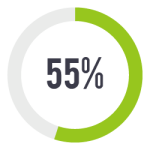
ACCEPTANCE

VISIBILITY

COMMUNITY
Timeline
- By the early 2000s, most Western countries began to show their support and become more progressive towards the LGBTQIA+ community. The Netherlands became the first country to legalise same-sex marriages in 2001, with many countries introducing similar laws in the last twenty years. Social media and smartphone apps have connected the global gay community much better. Apps such as Grindr and Tinder make meeting other like-minded people a quick and more straightforward process, all at the push of a button and often from the comfort of your home. The number of countries to decriminalise same-sex laws had increased to 156 or 66.8%, and visibility had greatly improved
- Through positive role models, and more accepting societies, groups and organisations worldwide, it is reported that more millennials openly identify as LGBTQIA+ than ever before. Though some countries and groups are more hostile towards the community, generally, large gay communities live within tolerant and progressive societies. The age of the internet, social media and mobile technology has meant that millennials are more vocal about their rights, how they have been treated, and the change they want to see, a privilege and opportunity than any other gay generation that has been able to do before
Environment
- In 1981, a new virus created a pandemic amongst the world’s population that took millions of lives and still affects people even to this day. The disease is believed to have started in the Democratic Republic of the Congo and was a sexually transmitted disease that spread quickly amongst the gay community. Early into the pandemic, little was known about the disease. Initially, it was called the gay disease, given its impact on the gay community. Once the disease was better understood and spread amongst the heterosexual population through contaminated blood transfusions and being sexually transmitted, it was renamed the Human Immunodeficiency Virus (HIV), the virus which progresses to AIDS if untreated
- The 1980s was a difficult period for the gay community, and a lot of fear was created due to the HIV/AIDS virus. Initially, some believed that touching an infected person could spread the disease, and many of those with the disease were left isolated and feared. Anyone who identified as gay during that period would often be treated as though they had the virus, even though most were not infected. Some high profiled celebrities contracted the virus and publicly died from the disease, fuelling fear and discrimination. The virus and lack of knowledge around how someone could be infected created much confusion and hostility towards the community. Fear resulted in people verbally and physically abusing members of the community, resulting in many gay people repressing and hiding their sexuality to avoid suffering persecution

Pronounciation: (jen-uh-rey-shuhn al-fuh | ˈdʒɛn əˈreɪ ʃən ˈæl fə)
Year of Birth (ages in 2023): 2013 – 2025 (ages not yet born to 10)
Other Nicknames: Gen Alpha
- Generation Alphas are born into a period of tolerance, confusion, and turmoil. Many generations have pushed hard for equality, resulting in awareness and improvements regarding women’s, LGBTQIA+ and minority rights in many western countries. People have much more freedom regarding sexual and gender identities; however, the rise of social media has also seen an increase in cyberbullying and fake news. The Covid-19 pandemic has had a massive impact on those growing up during this period, with long periods of being in lockdown, online learning and isolation from friends and family
- Online streaming has changed the way the world watches TV shows and films. One of the earliest streaming services and one that still dominates the space today is Netflix. The service started in 2013, and now in 2021, it has over 200 million subscribers
- A significant disrupter in the transportation space has been the introduction of Uber. Most countries worldwide typically have metered taxi services with private hire services offered by many companies. In 2010, Uber launched a smartphone app that changed how we locate and book taxi services, making the process quick and easy. Accounts in which passengers can pay directly from their bank accounts or through card payments and maps in which you can find out how many taxis are available for hire in your local area
- Home automation and access to information changed in 2014 when Amazon launched the Alexa service, followed by Google Home in 2016. A range of devices in which users can interact with the virtual assistant devices directly. Obtaining information from the internet, streaming music and even controlling functions within your home all by using simple voice commands
World Population: 1.5 billion or 18%
- Africa (30.1%)
- Asia (10.7%)
- The Americas (53.1%)
- Europe (5.6%)
- Oceania (0.5%)
LGBTQIA+ Population: c.38.9 million

SAFETY
The average number of countries that had not decriminalised same-sex relationships

ACCEPTANCE
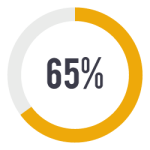
VISIBILITY

COMMUNITY
Timeline
- Even though 163 or 70% of countries worldwide have decriminalised same-sex relationships, 12 countries still impose a death sentence; if prosecuted. 70 or 30% of countries with laws are still criminalising same-sex acts. LGBTQIA+ stories and educating gay and straight people about the community have greatly improved. Many people, especially in western countries, are more accepting and supportive of the community. Some countries, playing on a return to traditional values or based on perceived societal mortality, such as Poland, Hungary, and Russia, have undone, restricted, or even limited the community’s rights. Though large numbers of people from the gay communities live in progressive countries, there are still large proportions living in environments where they are forced to hide or suppress their sexuality or gender identity
- Acceptance towards community members has dramatically improved, and many religious orders and groups have begun to accept and show support towards the wider community. With more people being open and honest about their sexuality, society is slowly changing long-held views. The portrayal of the gay and transgender community in the media has overall become positive. The community is much better connected with many dedicated social media platforms and groups; identifying as LGBTQIA+. As a generation alpha means, you can access a wealth of information and people’s personal experiences and advice. Online bullying and the rise of conversion therapy is an alarming trend affecting the well-being of many young alphas; however, their resilience and the challenges they faced early in their lives, such as the COVID-19 pandemic, will mean that the global LGBTQIA+ community will continue to grow and thrive
Environment
- In the 1990s, the gay community in many western countries became much more vocal. Organisations such as Queer Nation arranged protests and highlighted how many within the community were being treated worldwide. Throughout the 1990s, attitudes slowly began to change, and it was from the turn of the century that significant progress began to take place amongst the global LGBTQIA+ community
- In 2001, the Netherlands became the first country in the world to legalise same-sex marriages. A significant landmark, given that in 2021, 52 or 22% of countries worldwide now recognise same-sex marriages, and 70% or 163 countries have decriminalised same-sex laws. Attitudes and behaviours have significantly changed; however, 30% of countries still have laws in place criminalising same-sex relationships, and 12 countries still have the death sentence as the maximum penalty if prosecuted concerning sodomy laws
LGBTQIA+ COUNTRY & REGION GUIDES
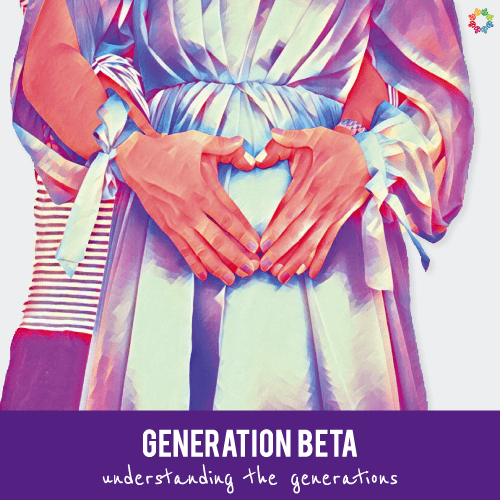
Pronounciation: (jen-uh-rey-shuhn bee-tuh | ˈdʒɛn əˈreɪ ʃən ˈbeɪ tə)
Year of Birth: (not yet born)
Other Nicknames: Gen Beta
- Generation Beta will hopefully see COVID-19 treated similar to the flu. With the proper precautions and vaccines, the effects and spread of the virus are managed and controlled. Climate change will become the biggest challenge for this generation as many will see fossil fuels dwindling, and if 2021, governments around the world do not enact change, they will witness the continued effects of global warming
- Artificial Intelligence and robotics will likely advance to the point in which most homes will probably have intelligent devices and aids to support them in their daily lives
- Transportation and getting around will become more affordable, safer and more accessible. With self-driving vehicles and clean fuels, transportation will likely reduce the time it takes to get from A to B
- With private companies developing space exploration, tourism, and even colonies could become a reality in the next 20 to 30 years
World Population: Not yet born
- Africa (0%)
- Asia (0%)
- The Americas (0%)
- Europe (0%)
- Oceania (0%)
LGBTQIA+ Population: Not yet born

SAFETY
The average number of countries that had not decriminalised same-sex relationships
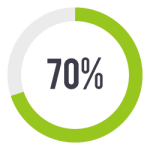
ACCEPTANCE
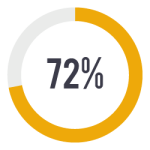
VISIBILITY

COMMUNITY
Timeline
- No one accurately knows what future generations will be like; however, the hope is that the countries still have laws criminalising same-sex relationships. Though they do not actively prosecute gay individuals will finally see those laws repealed. If that were to occur, the number of countries that decriminalised same-sex relationships would rise to over 175 or 75%. In more western countries, visibility has and will hopefully continue to improve with better representation and society as a whole, encouraging people to accept who they are and how they choose to live
- People worldwide are generally more accepting of non-traditional sexual and gender identities. Even in more conservative countries, many within the majority better understand that people from the LGBTQIA+ community are no different to themselves, wanting the same things out of life. The world is already well connected; however, with technological advancements such as virtual reality, many will continue to meet and form close bonds with people worldwide. Technology offers an opportunity to connect on an emotional and potentially even physical level, making accepting who you are and meeting other like-minded people much easier
Environment
- 22 of the 70 countries still criminalised same-sex relationships today do not enforce prosecutions. The hope is that in the next five to ten years, many countries will repeal these antiquated laws, reducing the number of countries still criminalising same-sex relationships below 50. International pressure and the economic reality of the global LGBTQIA+ community could see those countries with a death penalty significantly reduced or repealed altogether. In some of these countries, though same-sex relationships may still be a criminal offence, those facing prosecutions would likely see a prison sentence as the maximum penalty applied
- With the pandemic and economic woes of many countries worldwide, the concern is that history will repeat itself. Governments and the media create campaigns to appease or make the majority of the largest groups in the population happy. These campaigns aim to target or create false propaganda about minority groups, such as the LGBTQIA+ community. Narratives distract people from what is truly happening, often at the expense of vulnerable people. There are already examples of such campaigns; in 2020, Poland declared LGBTQIA+ free towns, and Russia and Hungary repealed progressive laws citing morality and protecting traditional values. Even though there are trends like this occurring; hopefully, with the positive developments made within the community, the outcome will be isolated and only occur in a handful of countries
Gayther...your community resources
Three dedicated websites offer various tools, services, guides, and much more. Free tools and services tailored toward all groups within the global LGBTQIA+ community
There are thousands of events taking place, it is not always easy to know what is going on and when, Gayther can help
RESOURCES TO HELP YOUR FRIENDS, FOLLOWERS, CUSTOMERS…
With over one thousand data points relating to weather stations worldwide, hundreds of LGBTQIA+ country and state travel guides, as well as community-related articles, fun and games, there is something for everyone on Gayther. Help your friends, followers or customers by including a badge or any one of the hundreds of colourful QR Codes within your newsletter, blog, vlog or website to direct them to resources that relate directly to you or your business or service. Discover QR Codes and Gayther Badges today
Discover more about the extensive tools, services and guides available on Gayther. From country and regional guides to LGBTQIA+ community resources, learn more about all that Gayther has to offer






